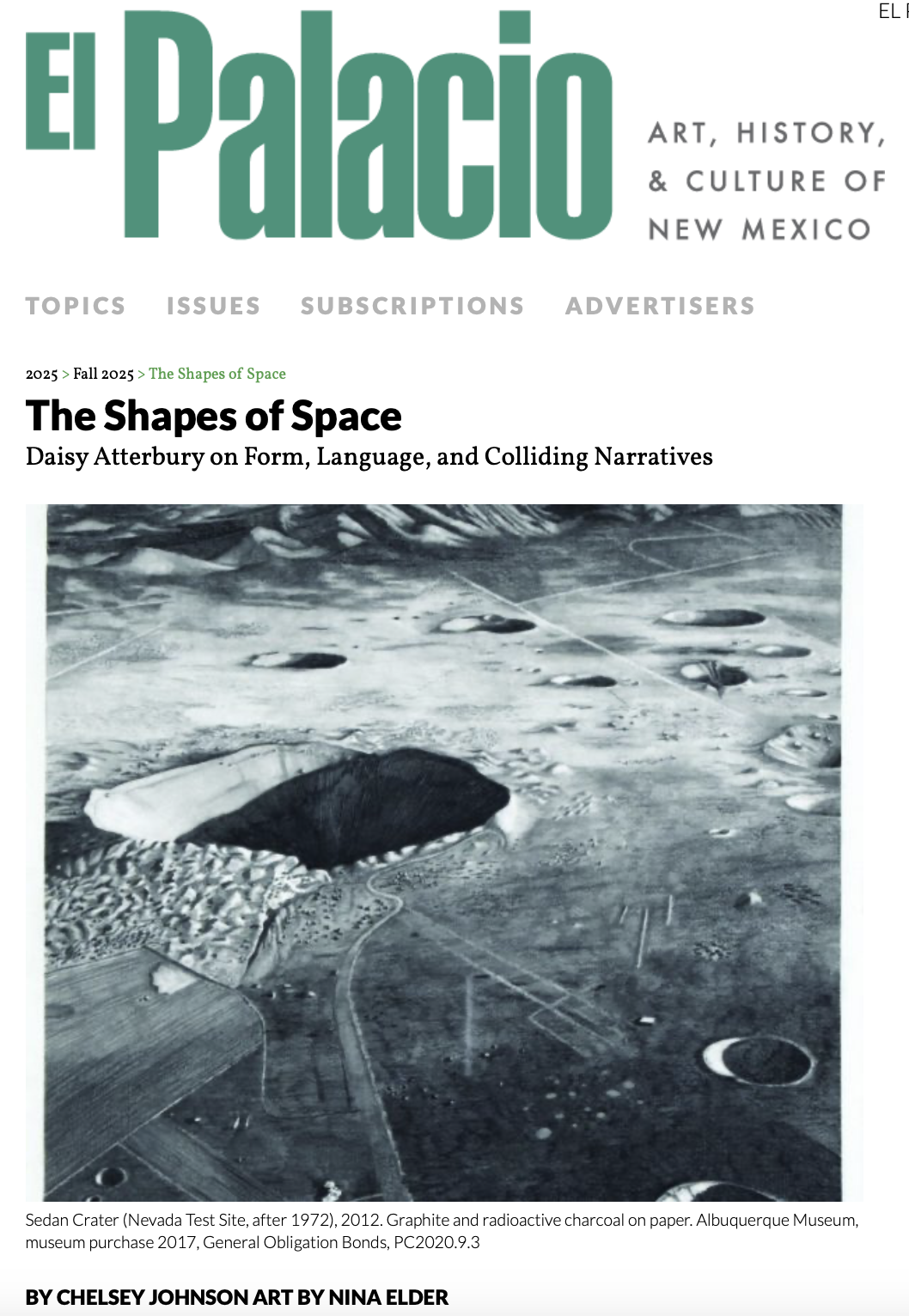
:
Sensual writing like Atterbury’s can illuminate the universes.
—Lucy R. Lippard
The Kármán Line is a cerebral altar to the desert with a language that is pura canción. Atterbury speaks to and from the corners of the New Mexico desert that take any traveler by surprise, mapping a celestial cartography suffused with a queer and powerful ache for a justice as radical as intimacy. A gorgeous read that makes adage out of scientific truth—we are all made of stardust. The Kármán Line raises its fist to the necessary ambulatory, this poignant and poisoned desert space continuum, eager to charm and disarm us at once.
—Raquel Gutiérrez
Books that matter offer us occasions for thinking the unacknowledged, lived edge of a feeling that counters the mythic edges society is built on: imagined frontiers, national boundaries, gender binaries. So does the love between two or more of us, between the one and the shifting sameness of us. The Kármán Linefirst proffers that edge and then diffuses it. Atterbury’s genre-orbiting book —adventurous, curious, imaginative, frightening—slips a narrative of transformation and desire into the lining of a story about atmospheric space, settler-colonial ambition, and the glacial horror of nuclear fallout.
—Divya Victor
Above the Kármán Line–the edge between earth and outer space–air is too thin to be turned into property. Space there is “free,” untethered from the territorial logic of the nation state. In dazzling prose, Atterbury explores the implosion of the colonial imaginary when thrust to an atmospheric breaking point. Writing from desert drives, sites of radioactive spills, queer loneliness, touristic space stations, they chronicle history at a molecular level–atoms of disaster lodged in the bodies we share and the water we drink. Since we’re already locked in with each other, with the trees, can the violence of our undoing transform into recognition of our depency, into love? With disarming softness, The Kármán Line erodes the ideology of containment. It softens the hard lines of our national and intimate demarcations. Suddenly, we’re dilated, made weightless by a poet who thinks with the stars.
—Mirene Arsanios
Do you want to be transported? By glitch, by star death, by "radical softness"? The Karman Line will make you think about space — its politics, its poetics, and its bodies — in an entirely new way. It weaves together a landscape of queer science in which the boundaries of the personal and the political are melted by the calm, "early body logic" of Atterbury’s distinctive voice, where poetry is theory, and theory is poetry. It is humbling, lucid, sexy, and sharp. It will change you. Dear workers of the earth, it’s not working. The objects are tidally locked. The craters are trauma; the aesthetic… is cinderblock. The Karman Line retraces the contours of love with an openness that retaps the spine into free-sky.
—Sara Deniz Akant
Reviews & Features:

(Read “The Shapes of Space: Daisy Atterbury on Form, Language and Colliding Narratives,” by Chelsey Johnson)
“Daisy Atterbury: On Negotiating Boundaries, Experimental Writing, Lucy Lippard, and Their Debut Collection ‘The Kármán Line’” by Sydney Bollinger, Write or Die
“Exceeding Boundaries in Daisy Atterbury’s Multi-Genre Book, ‘The Kármán Line,’” by Gina Pugliese, Your Impossible Voice
“Borders as Sites of Possibility in ‘The Kármán Line,’” by Cyrus Stuvland, Foglifter Journal
“Review of ‘The Kármán Line’ by Daisy Atterbury,” by Victoriano Cárdenas, Blue Mesa Review
“New Books By Emily Witt, Vigdis Hjorth, and Daisy Atterbury,” by Adrienne Raphel, The Paris Review
“10 Poetry Collections About Digital Life,” by Chris Campanioni, Electric Literature
“Uranium Yellow: excerpt from ‘The Kármán Line,’ Cleveland Review of Books
“Graduate Goes From Dissertation to Book Tour,” by Abe Loomis, The Graduate Center News
“Author Readings Around Boston Through March 15,” The Boston Globe
“On Daisy Atterbury, ‘The Kármán Line,’” Rob McLennan
“Sarah Deniz Akant on Daisy Atterbury,” Medium